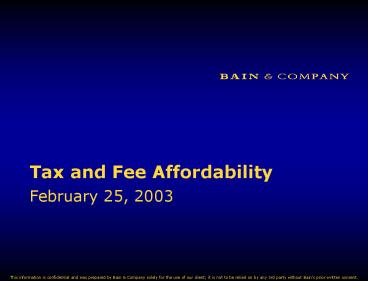Tax and Fee Affordability - PowerPoint PPT Presentation
1 / 25
Title:
Tax and Fee Affordability
Description:
Home repair costs. Groceries. Restaurant / dining out ... Atlanta's cost of living without taxes and fees is slightly below average for benchmark cities ... – PowerPoint PPT presentation
Number of Views:127
Avg rating:3.0/5.0
Title: Tax and Fee Affordability
1
Tax and Fee Affordability
- February 25, 2003
2
Agenda
- Overall affordability
- Taxes and fees
- Summary
3
Total cost of living components
Housing
Food
Transportation
Misc. goods and services
Health care
Examples
- Rent
- Purchase price
- Mortgage
- Utilities (electricity, telephone, etc)
- Home repair costs
- Haircut
- Dry cleaning
- Clothing
- Entertainment
- Liquor
- Commuter fare
- Auto maintenance
- Gasoline
- Groceries
- Restaurant / dining out
- Hospital room costs
- Office visit costs
- Prescription drugs
Taxes and fees
4
Atlantas cost of living without taxes and fees
is slightly below average for benchmark cities
Average
Note Economist Intelligence Unit also ranks
Atlanta average at 68 out of 134 worldwide
citiesSource ACCRA (American Chamber of
Commerce Researchers Association) Cost of Living
Index, February 2003
5
Figure 1a Local government taxes and fees per
capita on Atlanta residents (by recipient)
(84-02)
Local option sales tax initiated
Education sales tax initiated
6
Figure 1b Local government taxes and fees per
capita on Atlanta residents (by source)
Local option sales tax initiated
Education sales tax initiated
7
Taxes and fees per capita paid to the City of
Atlanta through 2002
(84-02)
Local option sales tax initiated
Note Assumes zero population growth after 2002.
Note Property tax increases in 2003 and 2004
are due to assumed increases in home value
appraisals. No changes in millage rates are
assumed.
8
Figure 2 Taxes and fees per capita paid to the
City of Atlanta through 2004
(84-02)
Local option sales tax initiated
Note Assumes zero population growth after 2002.
Note Property tax increases in 2003 and 2004
are due to assumed increases in home value
appraisals. No changes in millage rates are
assumed.
9
Figure 3 Ratio of total local government taxes
and fees to income
Average
Local option sales tax initiated
Education sales tax initiated
10
Figure 4 Comparison to other cities 2000 state
and local tax burden
Note Tax burden is property, income, and sales
taxes plus auto taxes and fees paid by citizens.
Cities selected from benchmarking study dated
3/21/02. Source Government of the District of
Columbia Tax Rates and Tax Burdens In the
District of Columbia- A Nationwide Comparison-2000
11
Figure 5 Comparison to other cities 2000 local
tax burden (proxy)
Note Burden is local portion of taxes paid by
citizens. Local tax burden is a proxy because
this analysis assumes that all property taxes go
to municipality. Source Government of the
District of Columbia Tax Rates and Tax Burdens
In the District of Columbia-A Nationwide
Comparison-2000
12
Figure 6 Property taxes per capita paid by
Atlanta residents
13
Figure 7 Breakdown of total property tax
increase (1992 vs. 2002)
14
Figure 8 Breakdown of total property tax
increase (1998 vs. 2002)
15
Figure 9 City of Atlanta residents property tax
millage rates
Local option sales tax initiated
Note The state has had a constant 0.25 charge.
Included in each millage division is the general
levy and the bond levy for that entity. Parks
have maintained a 0.50 levy which is included
within the City of Atlanta. Source City of
Atlanta Revenue Department, Fulton County
16
Figure 10 Appraised house value growth rates
segmented by house value ranges
Note Only five representative deciles shown so
as to prevent the graph from becoming
cluttered Source Fulton county appraisal data
17
Figure 11 Percent of property taxes paid
segmented by house value ranges
Source Fulton county appraisal data
18
Figure 12 Percent increase in house values (2002
vs. 2001)
Source Fulton county appraisal data
19
Some key factors influencing level of taxes and
fees
Percent of MSA (density)
Government policy
One time events
Level of tourism and conventions
Economic development
Tax and fee levels
Poverty level
Macro-economic influences (e.g. economy)
Age of infrastructure
Amount of parks and greenspace
Multiple other factors
Crime rate
Efficiency of government operations
20
Density of metro area benchmarks
Source U.S. Census Bureau (2000)
21
Poverty level benchmarks
17
Source U.S. Census Bureau (2000)
22
Crime rate benchmarks
7.9K
1.3K
Source FBI, Crime in the United states (2000)
23
Adjusted personnel per 100k Residents for roughly
comparable services/departments
24
Things to consider to keep Atlanta affordable
- Carefully monitor, benchmark, and manage all
elements of tax bill over-time - Continue improvement in efficiency,
effectiveness, and financial stability - Continue development and execution of long-term
plans for infrastructure - Focus on economic development
- Focus on housing, density, and development
patterns - Influence state and federal policies
25
Summary
- Overall cost of Living in Atlanta is slightly
below average of benchmark cities - Tax and fee levels for City residents are also
slightly below average - The portion of annual income consumed by local
taxes of all types has increased by 1.5 points
over 20 years - Average annual growth in local government taxes
in fees has been 3.4. City of Atlanta growth
has been 1.6 - Recent growth in property taxes driven primarily
by increasing home values - Alternatives need to be considered to maintain
affordability in the future































